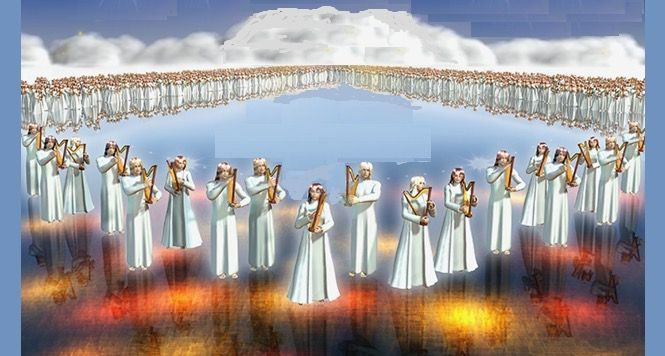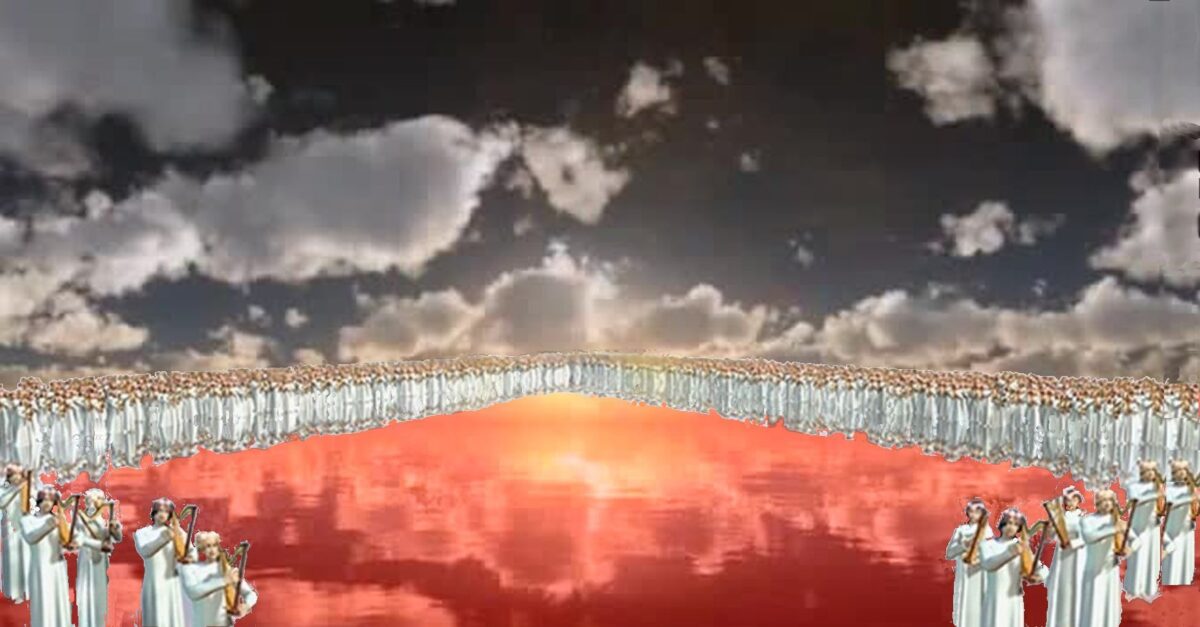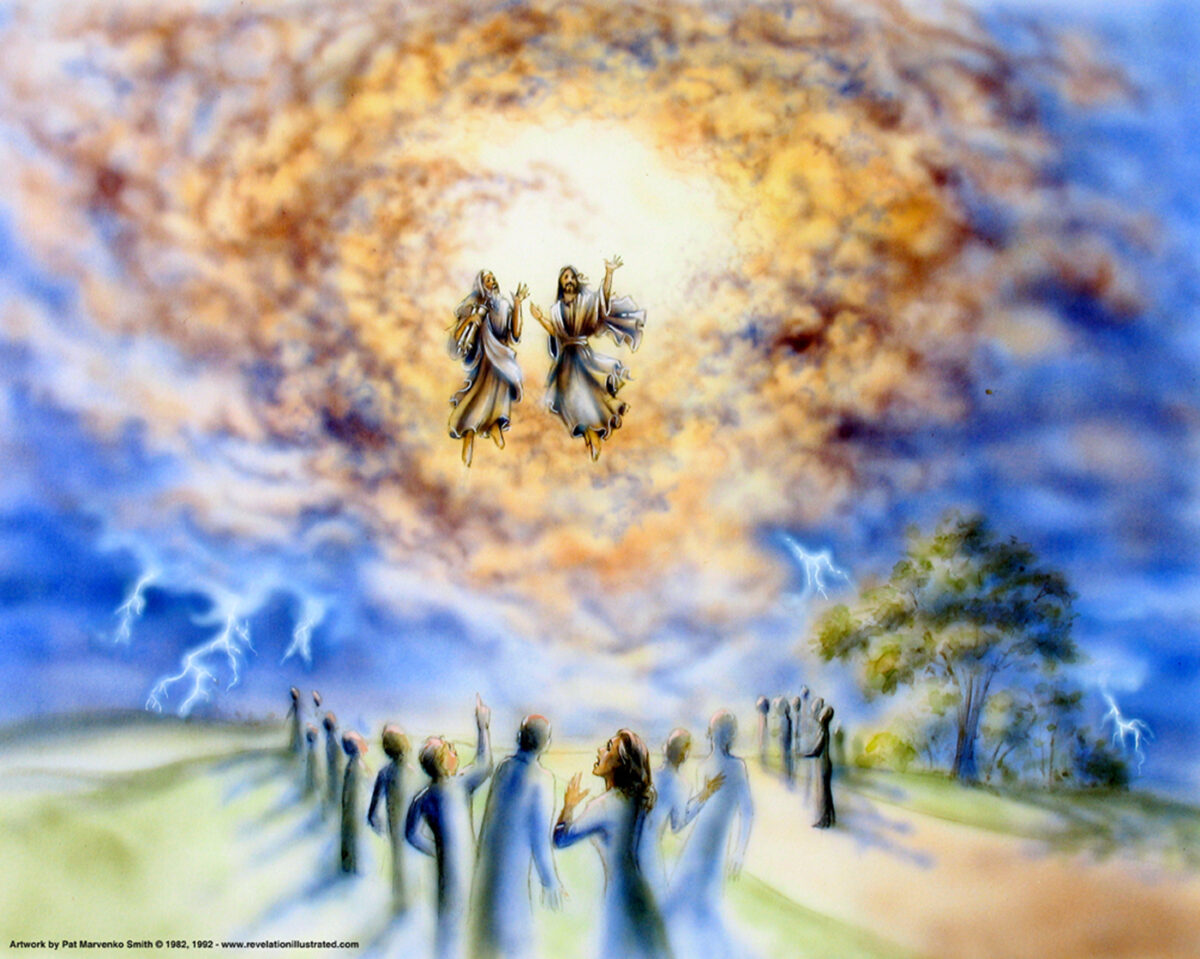“They sing the song of Moses, the servant of God, and the song of the Lamb, saying: ‘Great and marvelous are Your works, Lord God Almighty! Just and true are Your ways, O King of the nations!’” Revelation 15:3
Last time in our study of Revelation 15, the apostle John saw believers who were martyred during the last half of the Tribulation (cf. 6:9-10; 8:3-5; 14:18) standing victoriously on a sea of glass with harps of God in their hands ready to praise the Lord (15:1-2)! The crystal-like “sea of glass” before the throne pictures the purity of God and the complete calmness of His throne room in heaven before His judgments resumed on earth. While the “nations rage” (Psalm 2:1) on earth against the rule of God like a “troubled sea” (Isaiah 57:20), all is calm before God’s throne in heaven. In the next verses we see what these martyred believers do in heaven and why.
“They sing the song of Moses, the servant of God, and the song of the Lamb, saying: ‘Great and marvelous are Your works, Lord God Almighty! Just and true are Your ways, O King of the nations!’” (Revelation 15:3). These victorious believers are singing two songs. The first is “the song of Moses, the servant of God” which exaltsGod’s “works” in judging His (and their) enemies who hate Him and His people (15:3a).
“Just as Moses sang in triumph after Israel’s Egyptian enemies had been swallowed up by the Red Sea (see Exodus 15:1-18), followers of Christ from the Tribulation will sing at the prospect of Satan, the Antichrist, and the false prophet being overwhelmed with judgment. This song will be even more glorious than that of Moses, though, because the judgment will be carried out by the Lamb of God. Jesus was active in Moses’s day, following Israel through the wilderness (see I Corinthians 10:1-4). But He was not yet openly identified as the incarnate Messiah and Redeemer, as He is here.” 1
The second song is “the song of the Lamb” which seems to be a new song not recorded elsewhere in the Bible. The words to this song are what follows: “Great and marvelous are Your works, Lord God Almighty! Just and true are Your ways, O King of the nations!” (15:3b). The Lamb is “great and marvelous” in His “works” when He will judge His enemies at the end of the Tribulation period (Revelation 14:17-20; 19:11-21). Notice that the Lamb is called “Lord God Almighty.” Jesus is not merely a human prophet or good moral teacher. He is “Lord God Almighty.” He is also perfectly “just and true” in judging those who hate Him because He patiently gave them ample light (John 1:9) and witness of Himself 2 both indirectly through the things He has made (cf. Psalm 19:1-6; Romans 1:18-23) and directly through the Bible (Psalm 19:7-14).
“Who shall not fear You, O Lord, and glorify Your name? For You alone are holy. For all nations shall come and worship before You, for Your judgments have been manifested.” (Revelation 15:4). Although not all people will believe in Jesus during their time on earth, one day all people will “fear” and “glorify” His “name” (cf. Philippians 2:9-11), concluding that He “alone” is “holy” (15:4a). It is possible this occurs during or after the Great White Throne Judgment (Revelation 20:11-15). 3
After the Battle of Armageddon (14:17-20; 16:12-16; 19:15-21) when Christ will reign for a thousand years on the earth (Revelation 20:1-6), “nations shall come and worship before” King Jesus in Jerusalem (Psalm 2:6-9; 24:1-10; 66:1-4; 72:8-11; 86:9; Isaiah 2:2-4; 9:6-7; 66:18-23; Jeremiah 10:7; Daniel 7:13-14; Zephaniah 2:11; Zechariah 14:9, 16-21) because He dealt authoritatively with the worldwide rebellion of humanity through His “judgments” (15:4b). 4
Revelation 15:3-4 underlines a profound truth about worship. It does not matter if the songs are old (“song of Moses”) or new (“song of the Lamb”), the purpose of worship is to “glorify” God for His awesome Person (“Lord God Almighty”) and His “great and marvelous… works.” 5
The relationship between these two songs in Revelation 15:3-4 is vividly summarized by one commentator: “The song of Moses was sung at the Red Sea, the song of the Lamb is sung at the crystal sea; the song of Moses was a song of triumph over Egypt, the song of the Lamb is a song of triumph over Babylon; the song of Moses told how God brought His people out, the song of the Lamb tells how God brings His people in; the song of Moses was the first song in Scripture, the song of the Lamb is the last. The song of Moses commemorated the execution of a foe, the expectation of the saints, and the exaltation of the Lord; the song of the Lamb deals with the same three themes.” 6
I find it intriguing that these martyred believers from the Tribulation period who are now in heaven, enter into worship prior to the most devastating judgments of God on the earth. To those who were on the earth at the time these believers were martyred, to them it would have seemed that these believers lost to the Beast. But in heaven, these martyrs are celebrating a victory.
This reminds us that things are not always what they appear in God’s plan of redemption. What seems like a defeat is really a victory. God works in different ways than people do. Things are not always what they appear to be. The Beast thought he had permanently defeated his enemies, but they were celebrating the Beast’s upcoming defeat in heaven.
These martyred believers in heaven were also about to witness the entire history of the world coming to a climax in the upcoming bowl judgments about to take place on the earth. They are about to see the glory of God displayed like never before. The plans they once had on the earth no longer mattered in heaven. Their self-importance melts into God-centered worship. And this worship flows from the Person and work of God. This tells us that the more we know the Lord and His ways, the more profound our love for Him will be. We cannot fully worship the Lord until we know Him more fully.
In conclusion, because God is just and right in all that He does, including His most severe and devastating judgments, He deserves all our praise and admiration whether we understand His ways or not (15:3-4; cf. Isaiah 55:8-9). God’s ways are not our ways. None of us will question His judgments when we see them from heaven’s perspective.
Prayer: Lord God Almighty, teach us to worship You for who You are and what You do. Too often our worship of You fades into a preoccupation with our own needs and concerns. Help us to be still in Your presence, not asking for anything, just focusing on Your majesty and awe-inspiring works. You are just and right in all that You do even though we may not understand Your ways. Therefore, we can always trust You with everything. Thank You for reminding us that things are not always what they appear. People on earth may see martyrdom as a defeat, but in heaven it is celebrated as a victory. The world sees Christ’s death as a humiliating loss, but those of us who believe in Christ see it as an everlasting triumph over sin, death, and the devil. Thank You Lord God Almighty for leading us into Your triumph. In Your most powerful name we pray, Lord Jesus. Amen.
ENDNOTES:
1. Tony Evans, CSB Bibles by Holman, The Tony Evans Study Commentary (B & H Publishing Group, Kindle Edition 2019), pg. 2405.
2. Bob Vacendak; Robert Wilkin; J. Bond; Gary Derickson; Brad Doskocil; Zane Hodges; Dwight Hunt; Shawn Leach, The Grace New Testament Commentary: Revised Edition (Grace Evangelical Society, Kindle Edition, 2019), pg. 1556.
3. Ibid.
4. Ibid.
5. Charles R. Swindoll, Insights on Revelation (Swindoll’s Living Insights New Testament Commentary Book 15, Tyndale House Publishers, Inc., 2014 Kindle Edition), pg. 284.
6. Ibid., pg. 284 cites John Phillips, Exploring Revelation, rev. id. (Chicago: Moody Press, 1987), pg. 187.



